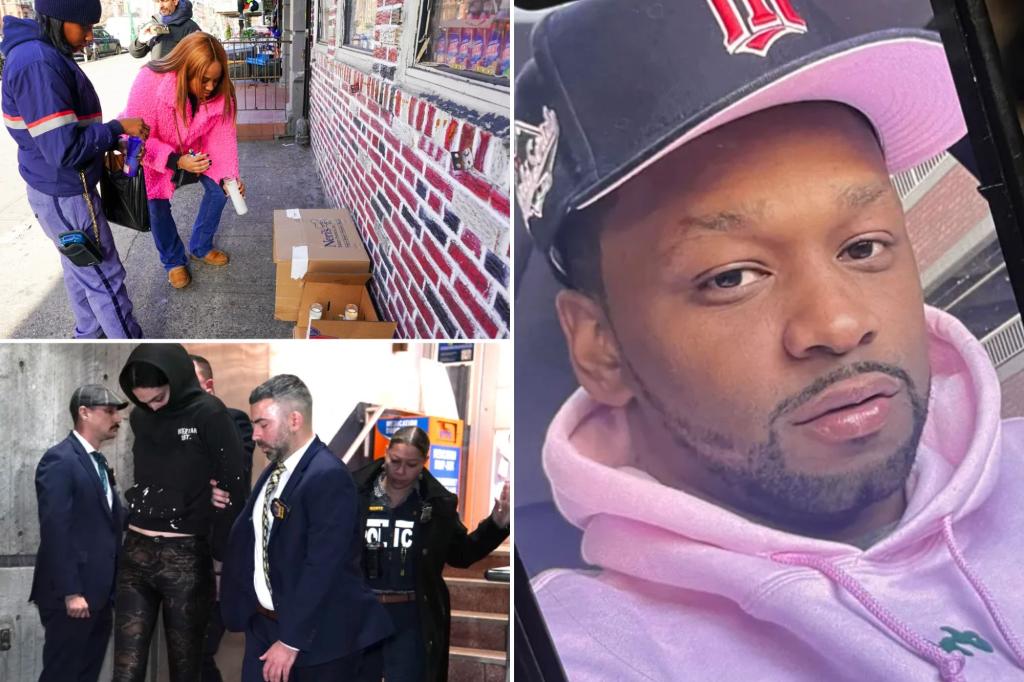The tragic death of Ray Hodges, a USPS worker, unfolded on a seemingly ordinary Thursday afternoon in a Harlem deli. Hodges, a dedicated mail carrier and father of two, had just completed a delivery and stepped into his regular lunch spot. Unbeknownst to him, this routine stop would become the scene of a senseless act of violence. His encounter with Jaia Cruz, a woman later charged with his murder, began with a seemingly trivial dispute over the order in which they would be served. This minor disagreement rapidly escalated into a fatal confrontation, leaving the community in shock and mourning.
According to a deli employee who witnessed the incident, Hodges was counting his money, preparing to order his usual sandwich, when Cruz entered the deli. She placed her grocery bags near the coffee machine and approached the counter to place her order. Hodges, seemingly preoccupied, indicated he was in the midst of figuring out his order. This seemingly innocuous interaction sparked an argument between the two individuals, who the deli worker recognized as regular customers. The argument escalated quickly, drawing the attention of other patrons and the deli employee himself, who attempted to intervene and diffuse the tension between Hodges and Cruz.
Despite the initial efforts to de-escalate the situation, Cruz persisted in confronting Hodges. Multiple people inside the deli managed to separate the two individuals several times, but Cruz repeatedly attempted to re-engage with Hodges. The deli employee, stepping between them in an attempt to quell the conflict, found himself unwittingly caught in the middle of the escalating altercation. The verbal dispute took a drastic turn when Cruz spat in Hodges’ face, an act that inflamed the already tense situation.
Hodges, understandably angered by the act of disrespect, reacted by throwing a bottle of lemon juice at Cruz. This action, while fueled by anger, proved to be a fatal mistake. In response to Hodges’ retaliation, Cruz allegedly grabbed a knife and lunged at him. The deli worker, who had been standing between the two, was forced to move to avoid being caught in the attack. Cruz then allegedly stabbed Hodges in the neck and stomach. The horrifying scene unfolded in front of shocked onlookers, who immediately called 911.
Emergency services rushed Hodges to Harlem Hospital, but tragically, he succumbed to his injuries. Just minutes before the fatal encounter, Hodges had been interacting with several of his customers, including Alejandro Alarcon, who recounted his final interaction with the mail carrier. Alarcon spoke of Hodges’ helpful nature, recalling how he had checked for a package Alarcon was expecting just moments before the tragic incident. Alarcon returned minutes later to find the deli cordoned off with yellow tape, blood staining the sidewalk, and the horrifying realization that his friendly mailman had become the victim of a senseless act of violence.
The sudden and brutal nature of Hodges’ death has left the community reeling. Alarcon expressed his shock and disbelief, questioning how such a trivial dispute could escalate into such a violent act. The tragedy has also instilled fear among residents, including Alarcon, who expressed concern about his own safety in the neighborhood. He lamented the rising crime rates and appealed for greater action from city officials to address the issue of public safety. The incident serves as a stark reminder of the fragility of life and the devastating consequences that can arise from unchecked anger and escalating disputes. The senseless loss of a valued community member has left a void in the neighborhood, highlighting the urgent need for effective measures to prevent such tragedies from occurring in the future.
The aftermath of the incident saw Jaia Cruz being taken into custody and charged with murder. She now awaits arraignment, facing the legal consequences of her actions. The legal process will unfold, aiming to bring justice for Ray Hodges and his grieving family. However, no legal outcome can truly compensate for the loss of a life so tragically cut short. The incident leaves a community in mourning, grappling with the senselessness of the violence that claimed the life of a dedicated public servant and beloved neighbor. The case raises questions about the underlying issues that contribute to such acts of violence and underscores the urgent need for community-based solutions to address conflict resolution and promote peaceful co-existence.










